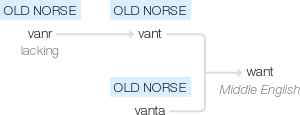Want
Middle English: the noun from Old Norse vant, neuter of vanr ‘lacking’; the verb from Old Norse vanta ‘be lacking’. The original notion of ‘lack’ was early extended to ‘need’ and from this developed the sense ‘desire’.
wiktionary
From Middle English wanten(“to lack”), from Old Norse vanta(“to lack”), from Proto-Germanic *wanatōną(“to be wanting, lack”), from *wanô(“lack, deficiency”), from Proto-Indo-European *h₁weh₂-(“empty”). Cognate with Middle High German wan(“not full, empty”), Middle Dutch wan(“empty, poor”), Old English wana(“want, lack, absence, deficiency”), Latin vanus(“empty”). See wan, wan-.
From Middle English wont(“mole”) [2], from Old English wand, wond, from Proto-Germanic *wanduz.
etymonline
want (v.)
c. 1200, "to be lacking," from Old Norse vanta "to lack, want," earlier *wanaton, from Proto-Germanic *wanen, from PIE *weno-, suffixed form of root *eue- "to leave, abandon, give out." The meaning "desire, wish for, feel the need of" is recorded by 1706.
want (n.)
c. 1200, "deficiency, insufficiency, shortage," from want (v.) and from Old Norse vant, neuter of vanr "wanting, deficient;" related to Old English wanian "to diminish" (see wane). Meaning "state of destitution, poverty" is recorded from early 14c. Meaning "thing desired, that which is lacking but needed" is from 1560s. Phrase for want of is recorded from c. 1400. Newspaper want ad is recorded from 1897. Middle English had wantsum (c. 1200) "in want, deprived of," literally "want-some."
